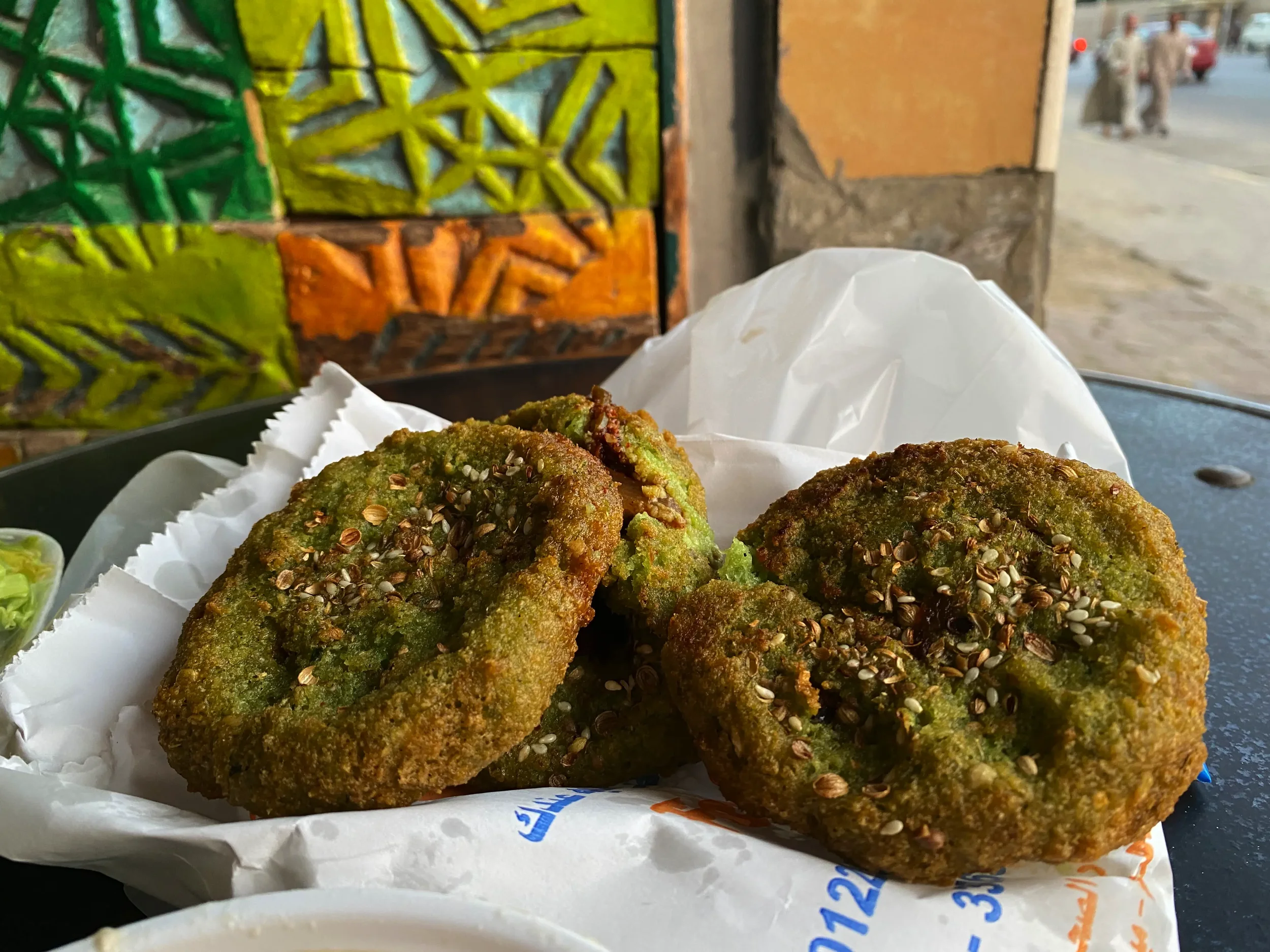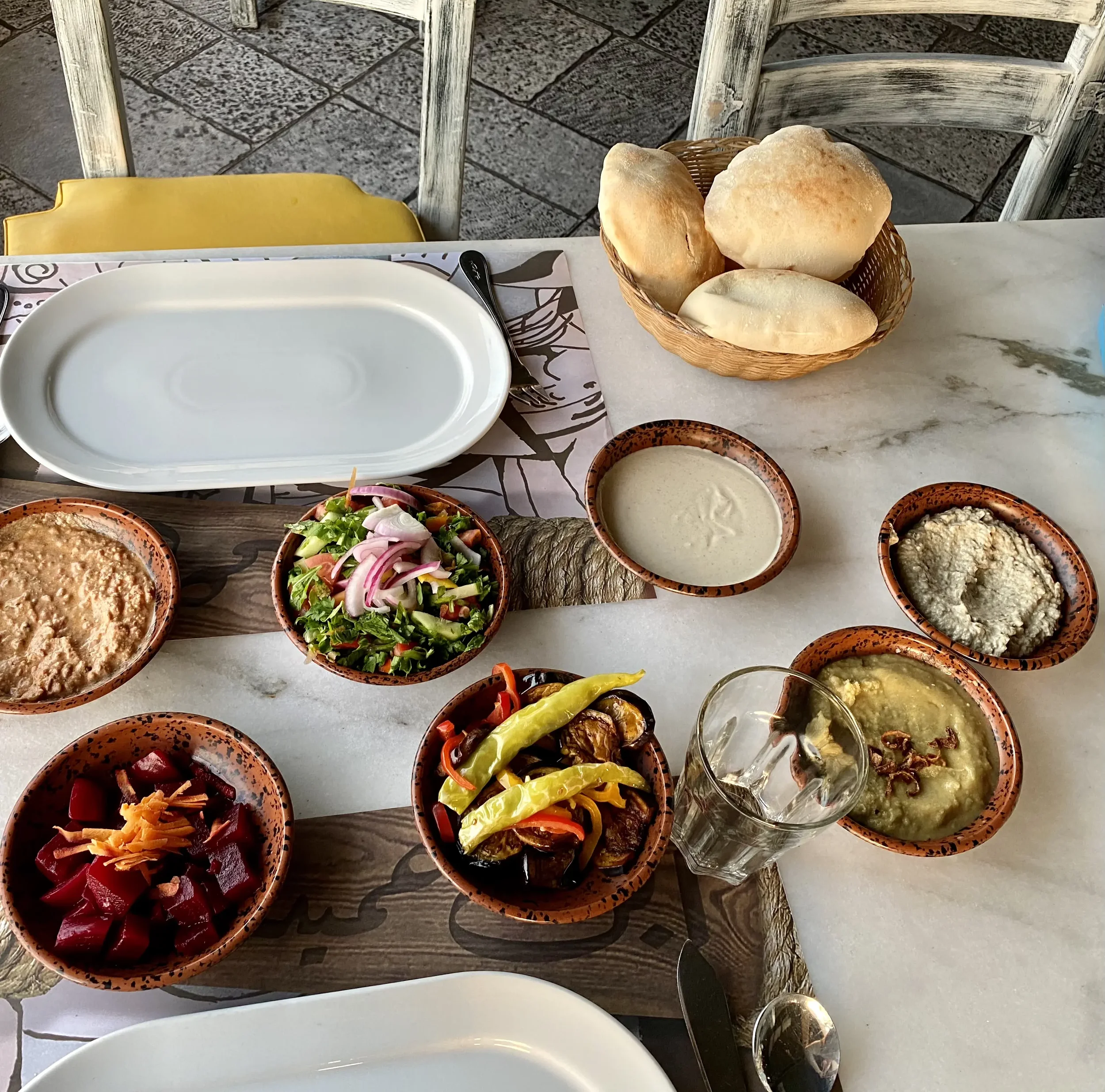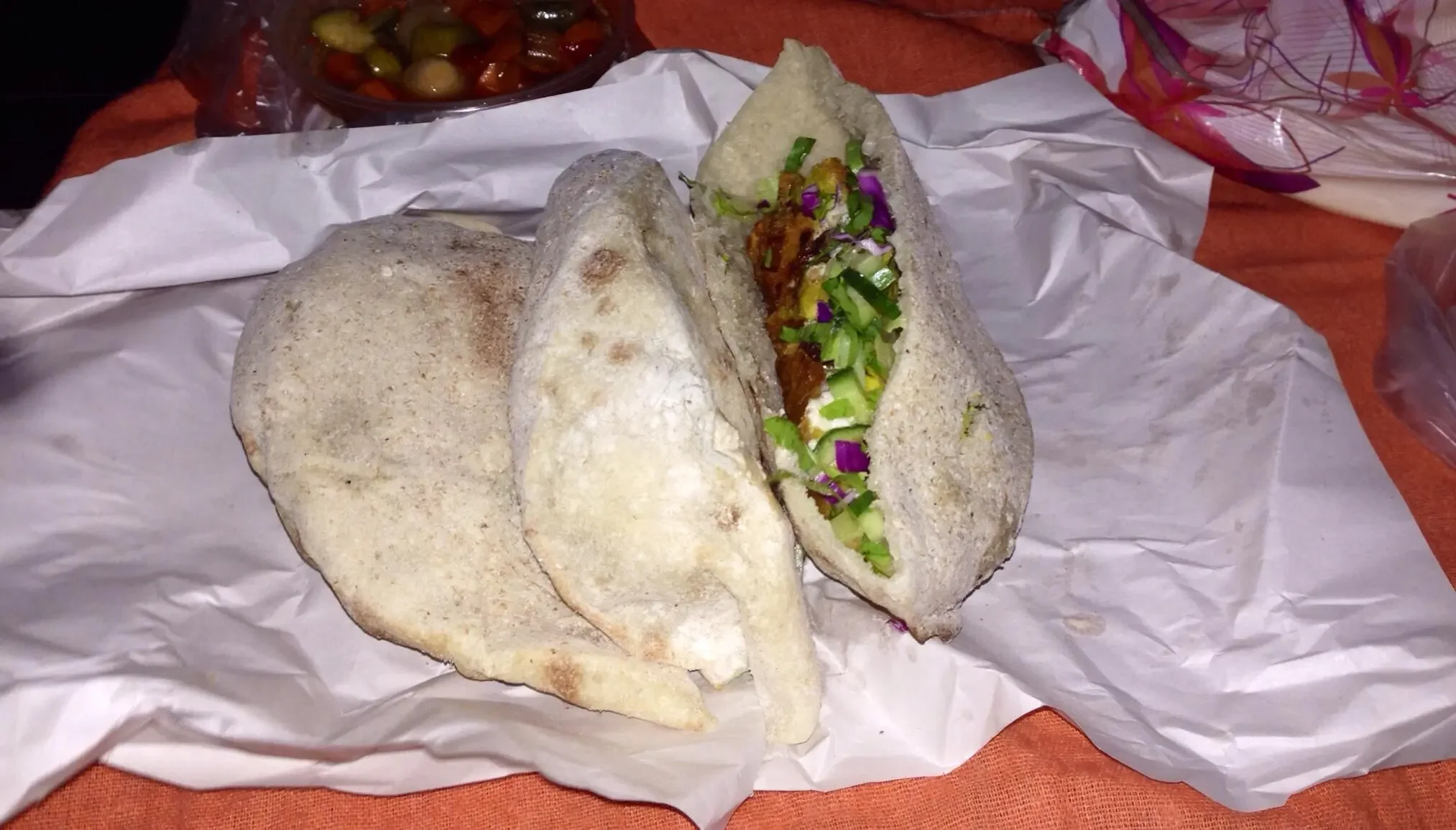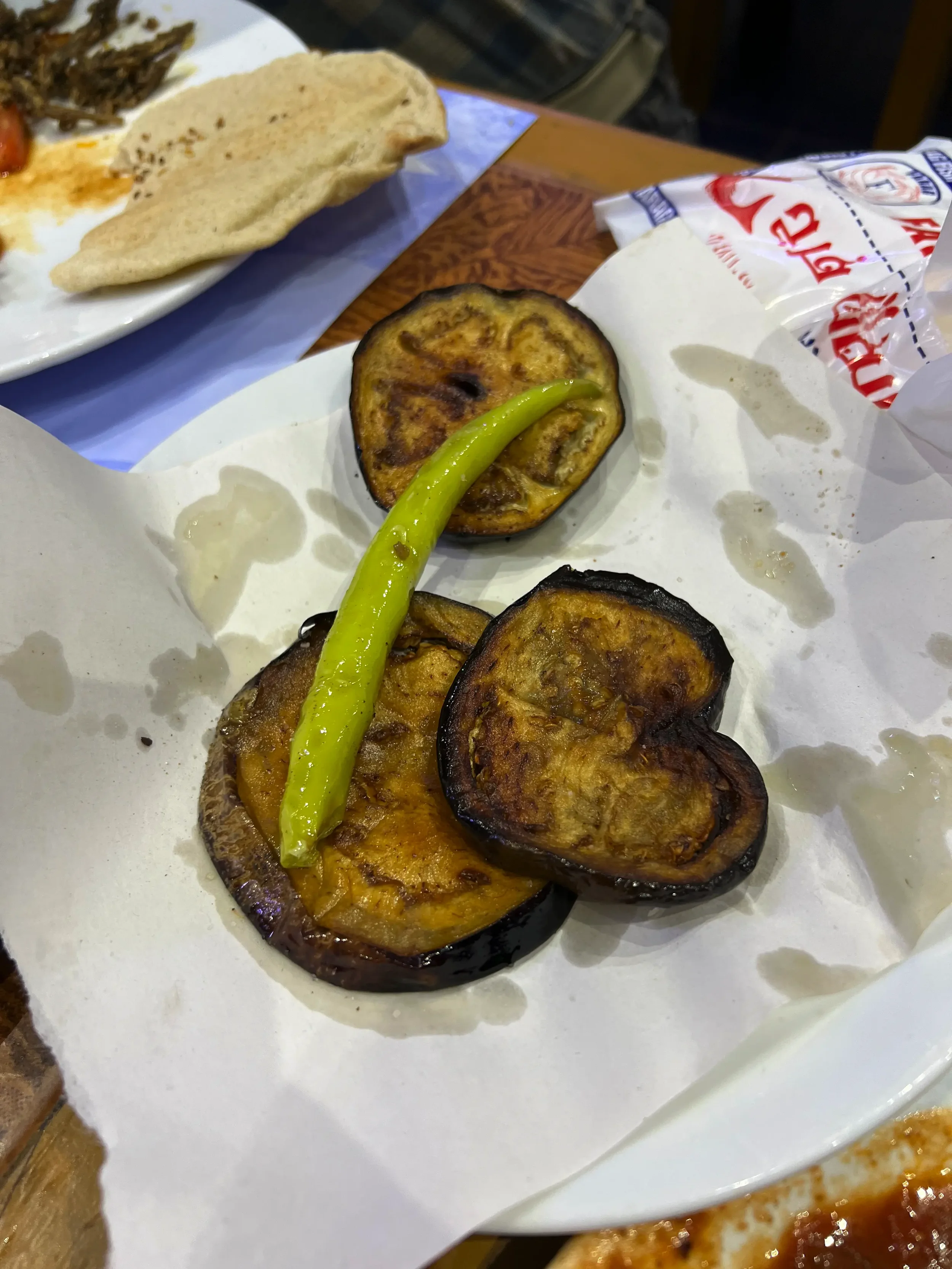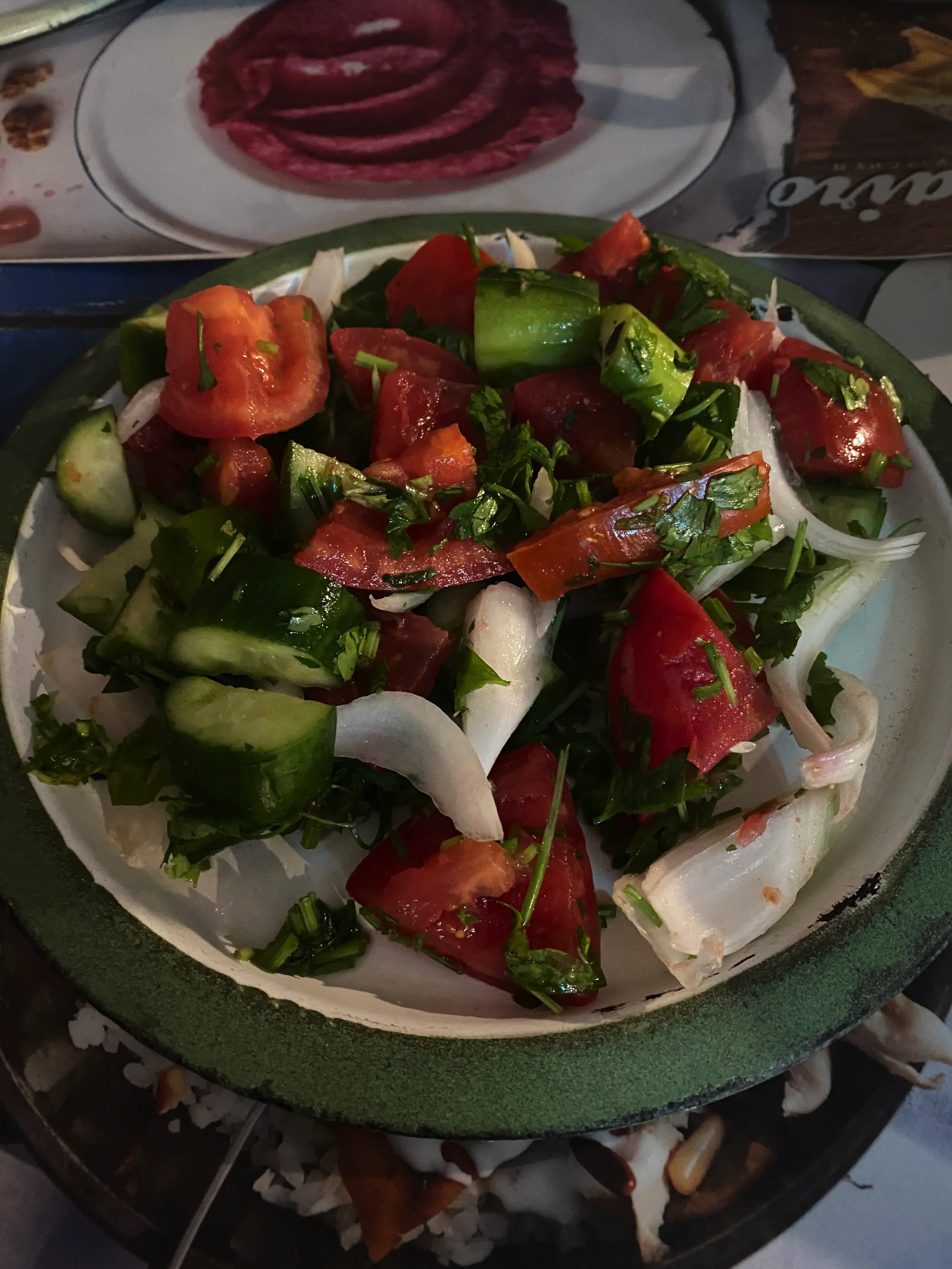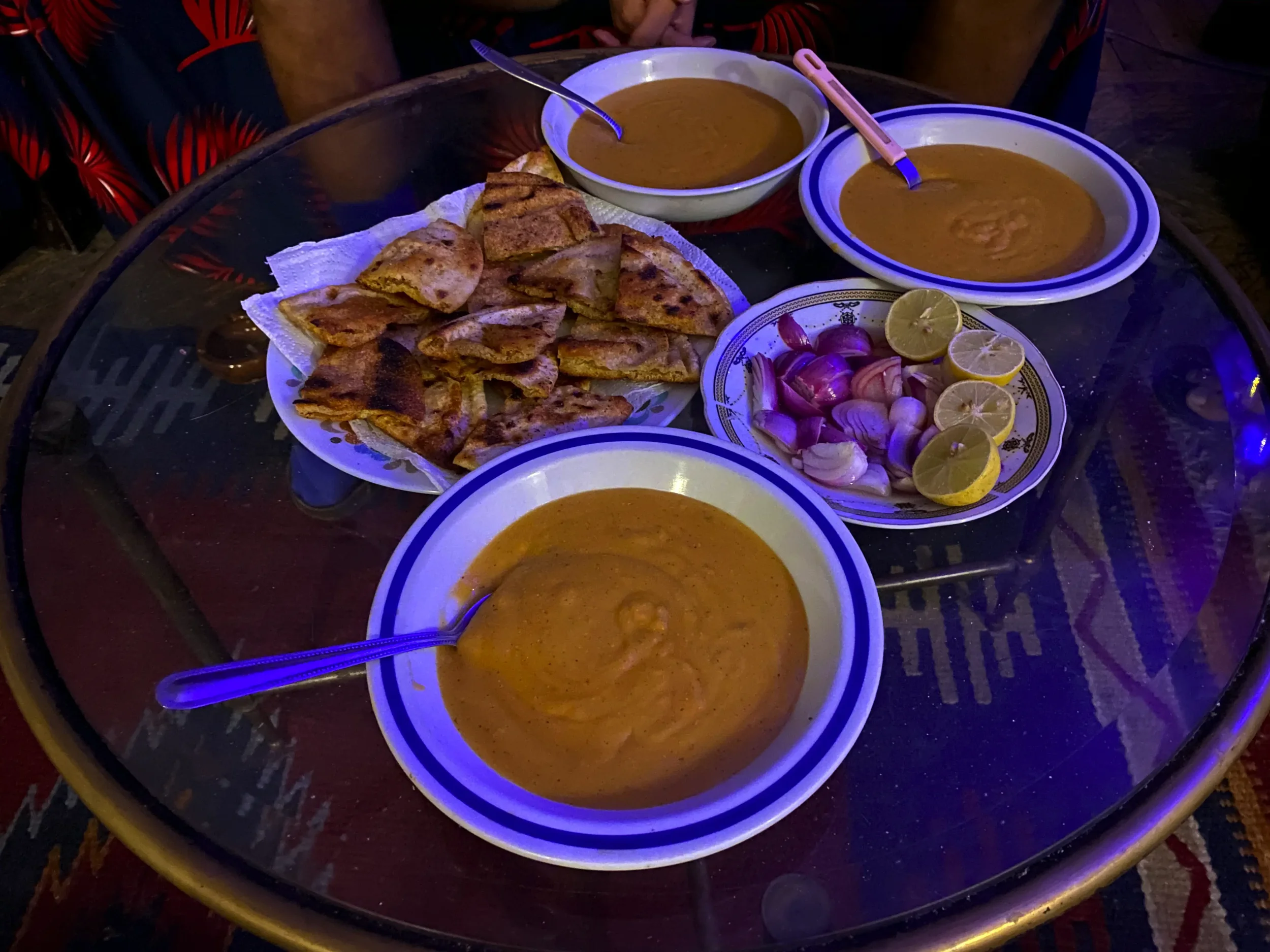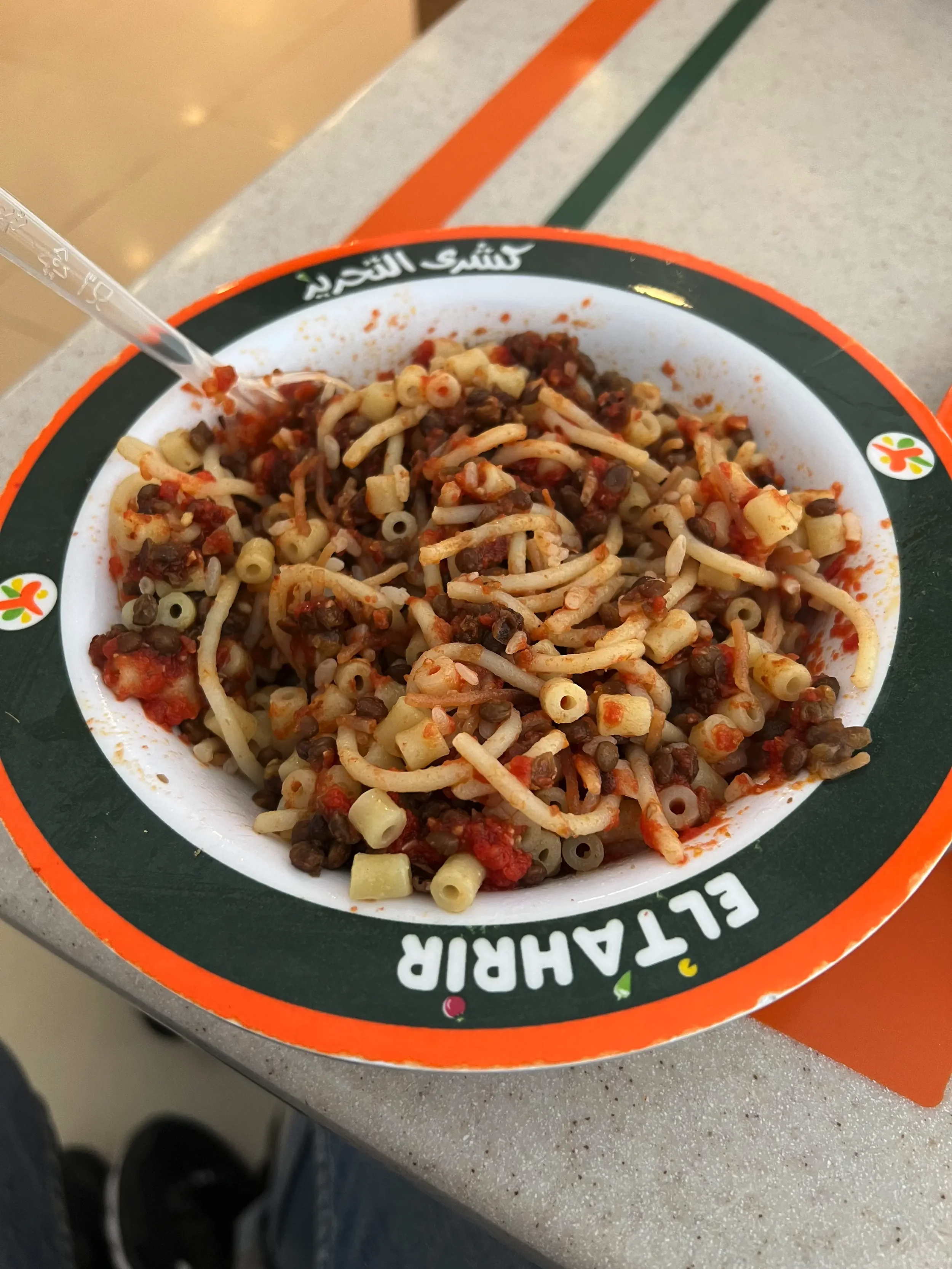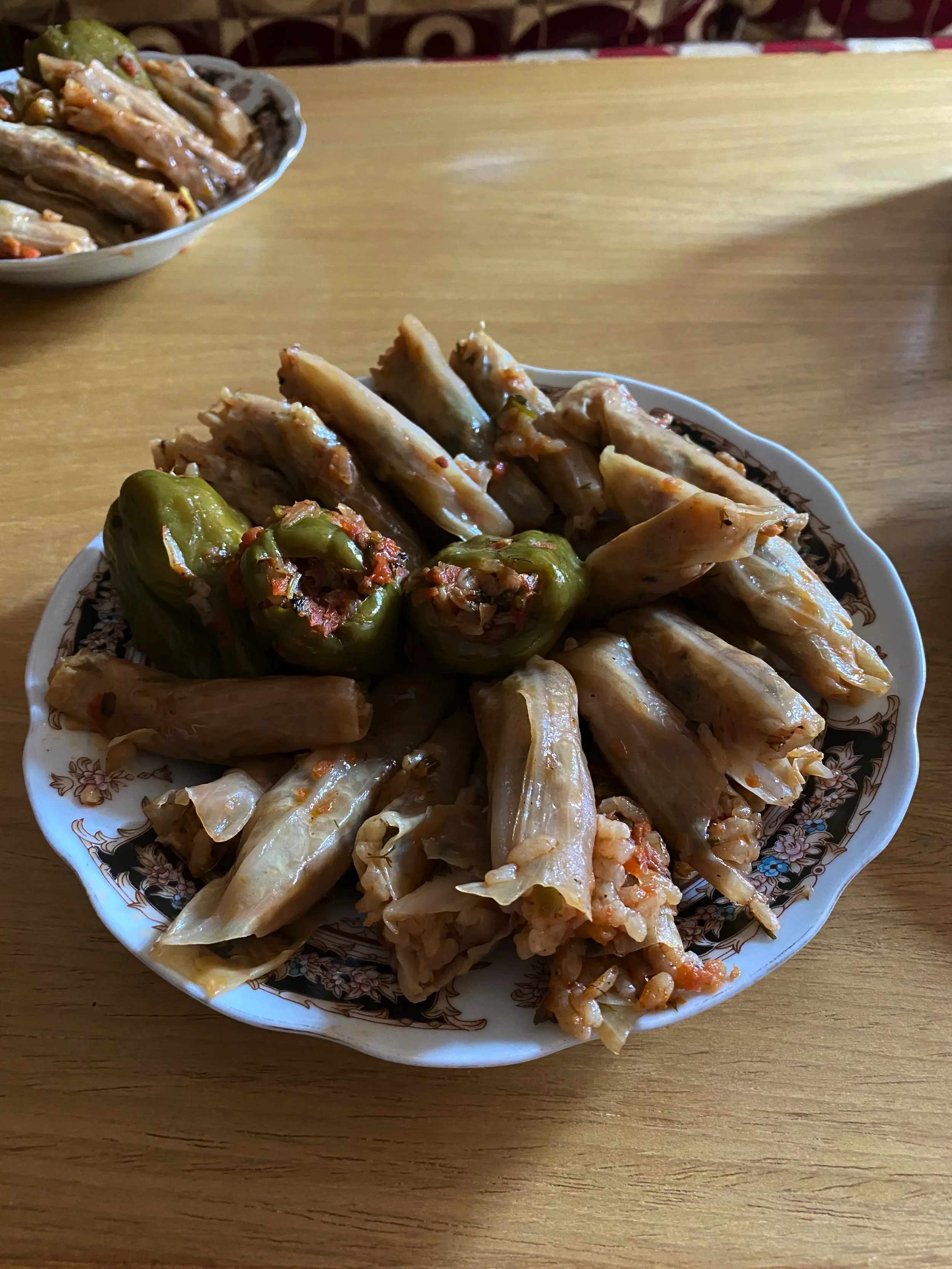Vegan food in Egypt: how and where to eat Egyptian vegan food!
Falafel (or Ta’amiya) is one of the most recognizble Egyptian vegan foods
There are lots of options for Egyptian vegan food you can try during your trip, since many dishes that Egyptian people regularly eat are already vegan! Let's talk about:
-How to say you are vegan in Egyptian Arabic
-Great options for Egyptian vegan food
-Specific restaurants you should try Egyptian vegan food at
Keep this post handy during your Egypt trip as a guide for helping you choose great Egyptian vegan cuisine at no matter what restaurants you try, from street food to fine-dining options!
Are you looking for vegetarian food in Cairo and Egypt in general instead? Check out my Egypt vegetarian food guide!
If you don’t know me already, my name is Gus, and I love Egypt! I have been living in Egypt off and on for over 12 years, I speak fluent Egyptian Arabic, and I have traveled to almost every destination in the country. I now inform travelers about everything Egypt, arrange trips for hundreds of travelers each year, and also personally lead group tours throughout Egypt. If you’d like help with your Egypt trip, fill out an interest form and I’ll get in touch to share how I can make your Egypt adventure come to life!
Join me (Gus) on a small group tour of Egypt!
Want me with you every step of the way on your trip, helping explain specific dietary needs in Egyptian Arabic, including a Nile Cruise with a personal chef to make tons of vegan dishes? Come on a group tour of Egypt with me!
How to say you are vegan in Egyptian Arabic
Being vegan is not something that is common or understood in Egypt at all - if you try to tell an Egyptian person you are vegan, you'll most likely be met with a big smile (but the person will have no clue what you mean), or a blank stare, and there is no direct translation of “I’m vegan” in Egyptian Arabic that will make sense, so don’t start typing that into Google Translate!
However, many Egyptian Christians eat a vegan diet dozens of days each year as part of religious fasting, so if you say in Arabic that you are a Christian who is fasting, any Egyptian will understand that you are only eating vegan food, and will serve you accordingly.
It's like a magical way to say you are vegan, without saying you are vegan, and having anyone understand you right away, even if they don't know that you're not actually fasting, but actually eat a vegan diet every day. Plus with tons of Egyptian vegetables being grown on local farms, vegan food in Egypt is incredibly fresh and delicious!
Here's how to say you are vegan in Egyptian Arabic (literally translates as "I'm fasting"):
“Ana seyami” (sounds like: eh-nuh see-yaw-mee).
أنا سيامي
If you say these magic words, voila! Tons of Egyptian vegan food will be brought to you in minutes, things like foul, koshary, mahshi, a vegetable tagin, vegan rice!
Many restaurants have an unwritten menu for Christians who are fasting (think of it like your vegan "secret menu"), so even if you do not see many vegan options on the menu, they may be available if you simply say you are fasting.
Now you know how to explain to any Egyptian person that you are vegan, and how to have Egyptian vegan food at almost any restaurant.
Egyptian Vegan Food: Small Plates, Appetizers, and Sandwiches
Egyptians usually eat meals consisting of several different small dishes, many of which can be vegan!
Egyptians often eat big meals consisting of many small plates, sharing family-style, in a tapas fashion. Lots of these small plates combined in total can make for a delicious Egyptian feast, and lots of them are naturally vegan!
Here are some great Egyptian vegan food options to order in combination:
Tahini Salad, eaten with pita bread (salatit tahina bil ayeesh balady in Arabic)
Tahini salad, similar to hummus (without the chickpeas), is a common dip that is served with almost every Egyptian meal. Tahini is made from ground sesame seeds, and then these are mixed with lemon juice, oil, and spices. The result is a creamy dip that is great to eat by itself with some pita bread (ayeesh balady in Arabic), or as a dip for grilled or roasted veggies, or as an additional sauce on a ta’ameya (falafel) sandwich.
Baba Gannoush Salad, eaten with pita bread (salatit baba ghanoog in Arabic)
Just like tahini salad, baba ganooush is a very common dip that is served alongside many meals in Egyptian cuisine, and Middle Eastern cuisine in general. An eggplant is smoked to oblivion, then mashed with a mixture of garlic, tahini, lemon juice, and olive oil.
The result is a deliciously creamy and rich dip with a smoky aroma and flavor. Egyptians eat this with pita bread, so grab a piece and get ready to scoop up some Egyptian deliciousness if you order a plate of baba gannoush!
Bessara Salad, eaten with pita bread (biss-sar-uh in Arabic)
Another salad, bessara’s main ingredient is fava beans, combined with cilantro, chopped parsley, dill, cumin, salt and pepper, and a little bit of mint, blended with some water to create a creamy dip that is enjoyed with pita bread, and topped with some fried onions for extra flavor and some crunch! Don’t let its weird green hue take you away from the amazing taste of this dip.
Falafel sandwiches make for a great vegan meal in Egypt
Falafel, or Ta’ameya (fuh-laa-full or TAA-may-yuh in Arabic)
Egyptians refer to falafel as either falafel or Ta’ameya (varies depending on which region you are in, or to whom you’re speaking), but both words are universally understood and used. The main difference between Egyptian falafel and falafel in other places is that fava beans are the main base, instead of chickpeas, making falafel in Egypt more green on the inside, and in my opinion, more delicious!
Ta’ameya is made by combining cooked fava beans with several other ingredients, like chopped parsley, salt and pepper, garlic and onion, cilantro, dill, coriander, cumin, and sometimes sesame seeds (added on top). The mixture is combined in a food processor until it forms a pasty dough, which is formed into small balls and deep fried in vegetable oil.
Falafel might be served on its own (often eaten with pieces of pita bread), or it is commonly thrown into an open pita pocket, in addition to some cucumbers, tomatoes, lettuce, tahini sauce, and potentially other ingredients like fuul (fava beans), fried eggplant, or french fries.
It’s most commonly eaten for breakfast, but usually can be found at any time of day, even late at night, depending on the place.
Foul, or stewed fava beans (fool in Arabic)
Foul, also commonly written as fuul or ful, has been eaten since ancient Egyptian times, and it's made by taking fava beans and simmering them in several cups water until they’re nice and soft, and then mashing them up with other ingredients like salt, cumin, garlic, lemon juice, extra virgin olive oil, and chopped parsley, and stewing the entire mixture for hours, sometimes overnight, in a giant metal urn.
Fuul is most commonly served as a breakfast food, and is great in a pita bread sandwich, or if served in a side dish, scooped up with chunks of bread.
My favorite place to eat foul is at a 5-star hotel breakfast buffet, because the fuul there is always top notch, and they have what I call a “Foul Bar”, where they have heated foul ready to be scooped into a bowl, and then tons of little accoutrements to pop in, like lemon slices to squeeze, spices like salt, pepper, red pepper, cumin, and coriander, freshly chopped parsley and cilantro, and olive oil and tahini for drizzling over the top.
In Alexandria, they have a special version of fuul called “fuul iskandarani”, meaning Alexandria Foul, where the fava bean mixture is cooked with chopped bell peppers, onion, and tomato, adding extra veggies and flavor to the dish.
Fried potatoes (buh-tah-tiss in Arabic)
Egyptians love their potatoes, like most other folks around the world, and the most common way to eat potatoes in Egypt is to slice them into french-fry-sized pieces, and then fry them in vegetable oil.
Unlike in the USA, potatoes are not commonly eaten with ketchup (Egyptians usually leave the ketchup for pizza, which I’ve never been able to get into!), but are usually dipped in tahini salad, which after trying many many times in Egypt, I can now say I like much better than ketchup for my french fries!
In addition to eating them as a side dish, fried potatoes can become the main event in a potato sandwich, which is a piece of pita bread, opened up, stuffed full of french fries, and then drizzled with tahini sauce, for an amazing breakfast option.
Fried eggplant (bit-en-gan maa-lee in Arabic)
Fried eggplant in Egypt is delicious!
Bitengan is the Arabic word for eggplant, and most of the time when folks in Egypt say “bitengan”, they’re referring to eggplant that has been thinly sliced and fried in oil until it’s so soft it just melts in your mouth.
Fried eggplant pieces are commonly served as a side dish to be scooped up with generous pieces of pita bread, or they are added into a pita bread sandwich, sometimes combined with french fries, fuul (stewed fava beans), or falafel, to make a deliciously hearty handheld meal.
Egyptian “Balady” Salad (salata balady in Arabic)
Here’s one iteration of balady salad, or a classic Egyptian vegetable salad
In Egypt, the word “balady” refers to something local, so balady bread (local bread), and balady salad are a quintessential Egyptian type of food.
Balady salad is Egypt’s most common vegetable salad served at meals. Every Egyptian has their own spin on this dish, but the most common way to prepare balady salad is to combine finely chopped cucumbers, tomatoes, onion, and add parsley, cilantro, and some dill, then squeeze some lemon juice and throw some salt over the entire mix and stir everything together.
Lentil Soup (shor-bit AAHDS in Arabic)
Shorbet Adas, or Egyptian lentil soup, is made with lentils as its main ingredient, making this a great dish for vegans wanting some protein in their meal.
Lentils are combined with onion, celery, carrots, garlic, cumin, coriander, tomatoes, salt and pepper, and either oil, ghee, or butter for the fat (be sure to confirm which to make sure the dish is vegan), and after the soup is cooked for a long time under a medium heat, it’s often pureed into a creamy consistency.
Egyptian lentil soup is often served with crispy pieces of pita bread, and Shorbet Adas is naturally vegan if it’s made with oil, but if it’s prepared with butter or ghee, vegans will want to stick to another option, so be sure to ask!
Egyptian lentil soup is the perfect dish to warm you up in the winter
Moussaka (muss-eh-AAH in Arabic)
Egyptian Moussaka, unlike its more well-known Greek counterpart, usually is a naturally vegan dish, not commonly including any kind of meat or dairy products.
To make moussaka, Egyptians combine eggplant and tomato, cooking the mixture to smithereens alongside garlic, onions, and a combination of spices like cumin, coriander, and paprika.
Vegan Egyptian Food: Entrees and Main Dishes
Here are some larger dishes that Egyptians will sometimes eat on their own (like koshary), or will sometimes be combined with a few of the smaller plates mentioned above:
Vegetable Tagen (tah-gen khoodar in Arabic)
Egyptian tagins, like the Moroccan tajine, are combinations of meat, vegetables, and sauces, slowly baked in a pot and served hot! In Egypt, the tagin is usually a clay bowl, sometimes covered or uncovered, and a common vegan main dish is a tagin of vegetables.
Usually made of green beans, peas, carrots, and potatoes, baked in a delicious tomato sauce, this dish is served alongside rice and pita bread, and makes for a good vegan meal.
Koshary (koshary in Arabic)
You have to try koshary when you are in Egypt, and the best part is it’s naturally vegan!
Koshary, also written as koshari, is one of Egypt’s national dishes, and it is a bowl of carbohydrate heaven!
Koshary is made by combining cooked macaroni noodles, spaghetti noodles, chickpeas, lentils, rice, and topped with fried onions. A hearty smattering of tomato sauce, garlic-vinegar sauce, and hot sauce give the mixture tons of flavor and punch, and one bowl is enough to fill anyone up for an entire meal.
Mahshi (mah-shee in Arabic)
The Arabic word “mahshi” (also written as mahahshi) refers to something that is stuffed, and when used by itself, usually means stuffed vegetables.
Egyptians will hollow out zucchini and eggplants, or take grape leaves, cabbage leaves, or green bell peppers and stuff them full of spiced rice and then boil them until the veggies melt in your mouth and the delicious rice mixture fills your tummy with Egyptian deliciousness!
Mahshi is one of my absolute favorite Egyptian dishes of all time, so that means it's also my favorite vegan food in Egypt of all time, and I have been known to polish off an entire plate on my own, but who's keeping track?!
A plate full of Mahahshi (Egyptian stuffed vegetables) is one of my favorite meals of all time
Restaurants Serving Egyptian Vegan Food
Like I mentioned, almost all restaurants serve vegan dishes in Egypt, since they almost always have a special “fasting menu” for Egyptian Christians who are eating a vegan diet due to religious fasting, so you don’t need to seek out any specific restaurants in order to find vegan food.
In fact, the concept of “vegan restaurants” doesn't exist in Egypt (save for maybe a very small number, and in more expat-heavy areas, and not in areas tourists regularly frequent), since Egyptians don’t really have any vegan folks, culturally.
That being said, even though they aren't trying to be "vegan", certain places, like koshary restaurants or foul/falafel joints naturally serve only vegan food!
Zooba
Zooba has several branches throughout Cairo and also inside the Grand Egyptian Museum, and since they serve a variety of Egyptian food, naturally, many of their dishes are vegan!
Zooba is a great place to try falafel, foul, dips, and salads, and they also have lots of great sandwich options that are 100% vegan. Their take on Egyptian street food makes it a great choice for people who want to try something very local, but in a sit-down restaurant setting with English menus and more attention paid to hygienic preparation of the food.
Koshary Abou Tarek
Koshary is the number one most filling vegan food in Egypt, and koshary abou tarek is the number one spot to try it! Even though Abou Tarek is not officially a vegan Egyptian restaurant, they only serve koshari, which is a naturally vegan dish!
There is only one location of Koshary Abou Tarek, in downtown Cairo, and visiting this bustling koshary restaurant is a sightseeing activity in and of itself.
If you don’t have the time to go to Koshary Abou Tarek, finding a branch of Sayed Hanafy Koshary or a branch of Koshary El Tahrir are also good options to try Egypt’s national dish.
Note: most koshary restaurants are closed for the entire month of Ramadan and also for the Eid Holidays happening after Ramadan, just a heads up!
Bellies en Route Street Food Tours
Ok, so not a restaurant, per se, but Bellies en Route have been offering great street food tours, market tours, and cooking classes for years, and they cater specifically to vegan travelers!
Their local Egyptian guides will help you stop at several delicious, authentic food spots throughout an afternoon or evening tour of downtown Cairo, and this walking foodie dream places an emphasis on vegan food like koshary and falafel, and these common Egyptian street foods are naturally vegan!
Tabkhaa Space
A tiny sidewalk kitchen run by a very friendly Egyptian guy, Hakeem, who makes homemade Egyptian dishes every day (except Fridays and major holidays).
Hakeem speaks English very well and he caters specifically to vegan and vegetarian diners, by always offering a few options every day for folks with those dietary needs, and also clearly explaining what he has on hand that day that is vegetarian or vegan.
Check out this video in order to learn more about Hakeem’s restaurant and how to find out the menu of the day!
Foul or Falafel Joints (all over the place)
There are tons of spots, large and small, in Egypt that serve mostly foul and falafel, vegan staples! There’s Mohamed Ahmed in Alexandria, or in Cairo, El Shraouk or Abdullah Bashandy are great options. If you ask anyone where to find foul or falafel, chances are there will be a place close by!
Now you know how to say you are vegan, what Egyptian vegan food to order at restaurants, and some specific spots to visit to sample Egyptian vegan cuisine. What questions do you have about vegan food in Egypt? What vegan food did I miss? Have you tried any of these foods or restaurants, and what did you think? I love reading and replying to all of my readers’ comments!

